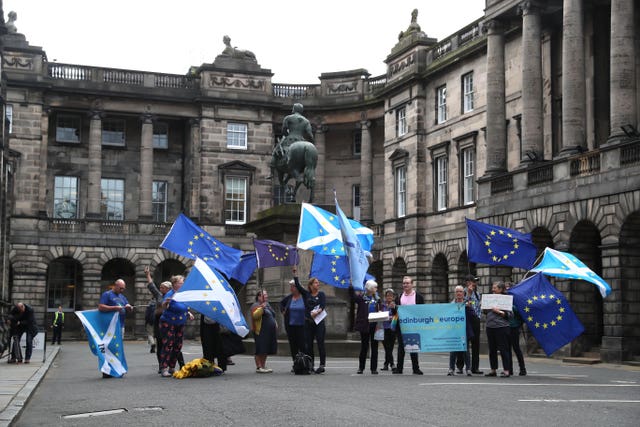Suspension of Parliament ‘considered as early as mid-August’
The details emerged as legal action aimed at halting the move got under way at the Court of Session in Edinburgh.

The UK Government appears to have been considering suspending Parliament as early as mid-August, documents submitted to a Scottish court suggest.
The details emerged as a legal action aimed at halting the suspension of Parliament got under way at the Court of Session – Scotland’s highest civil court.
A note dated August 15 from Nickki da Costa, a former director of legislative affairs at Number 10, and seen by Prime Minister Boris Johnson and his adviser Dominic Cummings, asked whether an approach should be made to prorogue Parliament.
A note of “yes” was written on the document, the Court of Session in Edinburgh heard, although the author of the annotation was not disclosed in court.
Aiden O’Neill QC, representing the parliamentarians, said: “One presumes this was a document sent in the red box to the Prime Minister to be read at his leisure.”
Mr Johnson replied the following day with a handwritten note describing the September session of Parliament as a “rigmarole” designed to show MPs were “earning their crust”.
He added it should not be “shocking” to suspend Parliament.

A decision was made to bring a full hearing forward to Tuesday from this Friday after the judge ruled it would be “in the interest of justice that it proceeds sooner rather than later”.
If an interim interdict had been granted it would have immediately lifted the royal order to suspend Parliament.
A full interdict could still be granted by the judge.
The case has been brought by a cross-party group of 75 MPs and peers.

He pointed to the documents as showing the suspension of Parliament policy was being considered much earlier than announced and argued the court had been misled.
The legal challenge was launched on August 6.
Mr O’Neill said: “This court was told nothing of that and was told in fact that this judicial review is academic, hypothetical and premature.
“That is not true. This court and these petitioners were being actively misled.”
He argued the real reason to suspend Parliament was to allow a no-deal Brexit to take place by removing proper scrutiny.
Mr O’Neill also said Mr Johnson was trying to govern as an “autocracy” using “one-man rule” by these attempts.
He added: “Why were these specific dates chosen? It’s because they think they’re gaming the system.”
It was argued decisions in two separate Brexit-related court cases, brought by activist Gina Miller and Andy Wightman MSP, show Parliament should decide whether or not the UK leaves without a deal.
Mr O’Neill said it was not lawful to create circumstances where that happens without such approval.
David Johnston QC, representing the Government, said the arguments were “academic” as it was not for the courts to decide if Parliament can be prorogued.
Mr Johnston said: “The issues these petitioners raise are political issues, political questions, and their resolution must be found in the political arenas.
“It’s true to say that accountability is an important aspect on which the constitution relies.
“But accountability to the courts is not the only form of accountability.
He added: “The proper forum for these matters to be scrutinised is the political forum.
“Those who make decisions that don’t go down well in the political forum will be held to account there – either in Parliament or, ultimately, by the electorate.”
Judge Lord Doherty said he hoped to announce his decision on Wednesday.





